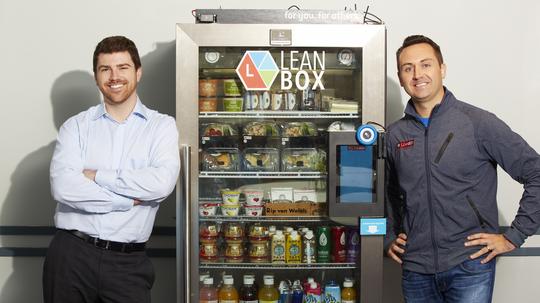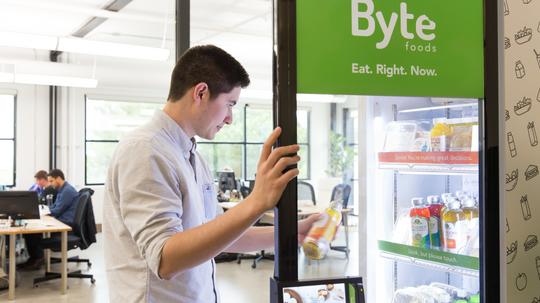![MichaelHeinrich Headshot 1 -edit 1100x1100[1]](https://media.bizj.us/view/img/12080401/michaelheinrich-headshot-1-edit-1100x11001*540xx1400-788-0-104.jpg)
For most of us, preparing for the return to the office is an exercise in mourning our favorite pair of sweatpants. But it’s a more substantial matter for Michael Heinrich, founder and CEO of Burlingame office catering startup Garten.
Heinrich must figure out exactly what food service options companies and office workers will want as we leave behind the worst (fingers crossed) stage of the pandemic.
He's making a bet that touchless automated food koisks will be in demand, announcing Thursday that he's closed a deal to acquire Boston-based LeanBox as its third acquisition since 2017. Terms were not disclosed.

“Our belief together is that more and more companies will shift away from the one big cafeteria where everybody congregates to more collaborative spaces,” Heinrich told me this week. “We have a lot of touchless systems that are easy to keep hygienic, and it helps us to stay flexible and nimble.”
Garten, launched in 2014 as Oh My Green, was forced last year to pivot from in-office catering, representing 90% of its business, to snack-at-home boxes and virtual speakers addressing mental and environmental wellness, a key part of nutrition. With its new products and the LeanBox deal, Heinrich said he expects about a 50-50 split in revenue between in-office products and unattended or at-home services.
The purchase of LeanBox follows its acquisitions of Marin-based Byte Foods in January 2020 and blissmo in 2017. To date the company has publicly announced $20 million in seed funding since garten’s formation in 2014. Heinrich said the company recently concluded a Series A round it will announce at a later date.

While the delta variant’s emergence has slowed what was once expected to be a “tsunami”-like deluge of returns to the office in September, for the most part garten’s customers — about 70% concentrated mainly in the Bay Area, with some representation in Boston, New York, Dallas and Austin — are sticking to their plans.
The CEO has been keeping up with weekly forecasts among his clients of who’s coming back to the office. He’s also paying close attention to which schools are resuming in-person classes, freeing up more parent workers to return to their workplaces.
“I would say it’s a good time to start investing but not over-investing. People are slowly coming back, but there’s still a wait-and-see approach through the October, November and even January timeframes.”
Garten is considering additional acquisitions in the near future “because it makes us as a combined entity significantly stronger to withstand any further Covid hits.” As the office recovery gets more robust, garten can then begin rebuilding its workforce with more hires in engineering and sales and marketing.
Industrywide, the pace of consolidation has picked as smaller and newer companies try to recover from the pandemic. Garten, Heinrich said, lost 90% of its revenue for several months in spring 2020.
“It’s sort of a perspective here of ‘last man standing,’” he said. “It took all of my staff and all of my wellness practices to get to this point.”
Heinrich described outlining financial models for the company board last year, including a worst-case option.
“There was one expected case and the other was the 5% case where we’re thinking ‘that’s never gonna happen.'”
We all know in which direction the world turned. The company was forced to conduct mass layoffs. The team “completely reimagined ourselves,” transitioning to a less cost-intensive model that provides its services through third-party logistics providers rather than its own employees.
“The experience felt like flying an airplane into pitch dark, and all the sudden losing connection with the tower,” he said. “Luckily, I had a long-standing meditation practice, like an inner anchor. I’m just really proud and grateful we’ve survived.”



